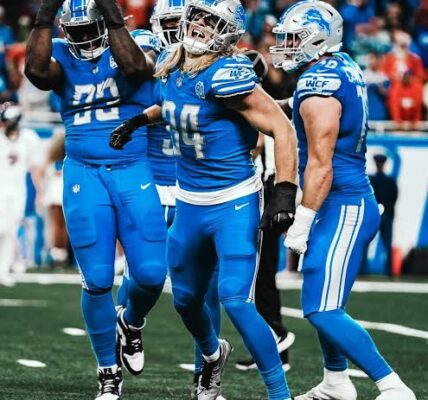After Jared Goff threw his fifth interception during Sunday’s game against the Houston Texans, wide receiver Jameson Williams, the intended target on the play, approached Detroit Lions offensive coordinator Ben Johnson on the sidelines with a question.
play, approached Detroit Lions offensive coordinator Ben Johnson on the sidelines with a question.
“Hey, was my angle correct?” Williams asked, recalling Johnson’s account from Thursday.
Johnson’s response was straightforward: “No, it wasn’t right.
It’s not what we had talked about,” but he reassured Williams that he’d get another chance to make up for the mistake in the fourth quarter.
That moment arrived when Goff connected with Williams early in the final period. The wideout grabbed a 17-yard pass, setting up teammate Amon-Ra St. Brown for a touchdown two plays later.
However, Williams paid a price for his contribution. As he caught the ball, he was hit from both sides—by a defender in front of him and another behind him.
He was shaken up but managed to return to the field for the following drive.
Williams ended the game with 53 yards on three receptions, helping the Lions secure a win over the Texans in his return from a two-game suspension.
“He’s really coming on and showing up,” said Johnson. “When you challenge him on the sidelines, he typically responds positively.
We knew, especially after the turnovers, that our margin for error was small, so he needed to make that play.
He did. His confidence—both in his hands and his attention to detail—continues to grow.”
Williams appreciated how the coaching staff trusted him enough to insert him back into the lineup immediately after his suspension.
He reflected on his previous suspension when he missed four games last season for violating the league’s gambling policy. At that time, he had to gradually ease back into the rhythm of the game.
This time, however, there was no slow build. He was right back in action, making plays right away.
“When your number is called, you’ve got to step up and make a play, no matter the circumstances,” Williams explained. “Whether you’re getting hit from both sides or not, you have to deliver.
It was a big moment for us, especially as we were mounting a comeback and fighting to win.
Every play counts, and when someone’s number is called, you have to come through. That’s what I felt, and I just focused on making that play.”
Meanwhile, special teams coordinator Dave Fipp has been getting to know rookie kicker Jake Bates over the past few months.
Fipp’s job isn’t just about evaluating Bates’ kicking abilities but also understanding the type of person Bates is. How does he respond to coaching? What’s the best way to communicate with him?
In the preseason, Fipp began to observe Bates more closely, learning how the kicker prefers to be coached.
Fipp reca andlled a moment during a preseason game when he tried to approach Bates with a coaching point, only to realize that Bates was so locked in on the game that he wasn’t receptive to input at that moment.
“I was watching him during warmups, seeing if there were subtle things I could say, but if he didn’t need it, I’d stay quiet and focus on the other guys,” Fipp said.
Bates has already made an impressive start to his career, hitting 14 consecutive field goals, including the game-winning kick at the buzzer to secure the victory over the Texans.
“Every player you coach is different,” Fipp remarked. “With kickers, less is more.
Too much coaching can get in the way, especially when each kicker has a different technique and style. My approach is to give them space and only offer guidance when it’s necessary.”
In the case of Bates, Fipp has learned that his kicker works best when left to his own devices, trusting in his abilities while offering occasional, subtle coaching when the situation calls for it.




